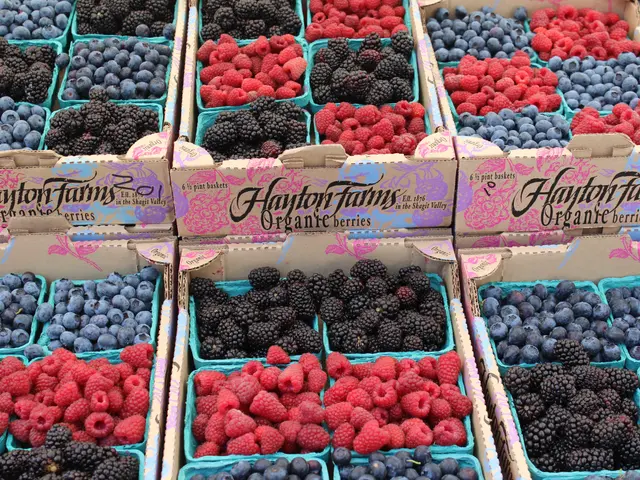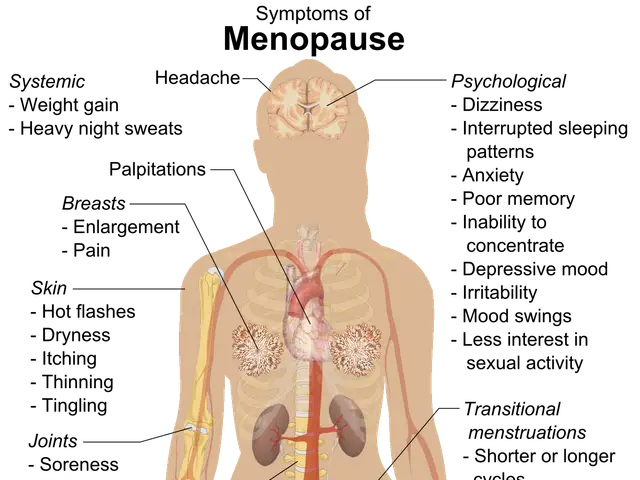Foods that lead to bloating and their substitutes:
In the quest for a bloat-free life, understanding which foods and beverages contribute to digestive discomfort is crucial. Common culprits often include ingredients that are difficult for the gut to process quickly, leading to gas production and bloating.
High-FODMAP foods, such as certain fruits, vegetables, legumes, wheat, rye, dairy products (for those with lactose intolerance), and foods with sugar alcohols, are notorious for causing gas and bloating, particularly in individuals with IBS or gut sensitivity. Lactose-intolerant individuals may find that lactose remains undigested and ferments in the gut, producing gas and bloating.
Processed foods, high in sodium and artificial ingredients, can also cause water retention and bloating. Fizzy drinks and alcohol, too, can increase bloating and gas due to carbonation and alcohol content. Certain vegetables and legumes, such as beans and some vegetables, also contain sugars and fibers that are hard to break down, leading to bacterial fermentation and excess gas.
Fortunately, there are several alternative dietary options to help reduce bloating and flatulence. A low-FODMAP diet, which involves reducing the intake of high-FODMAP foods, has been shown to be effective for minimizing gas, particularly in IBS sufferers but also generally.
A gut-friendly breakfast can set the tone for a bloat-free day. Oatmeal with banana slices and chia seeds, scrambled eggs with spinach and turmeric, and Greek yogurt with pineapple and mint are all examples of gut-friendly breakfasts. These foods provide fiber, probiotics, digestive enzymes, protein, vitamins, and anti-inflammatory effects, all of which contribute to gut health and help reduce bloating.
Peppermint tea or peppermint oil capsules can also help soothe gut discomfort and reduce bloating. Eating slowly and chewing thoroughly can minimize swallowing air and improve digestion, reducing bloating. Avoiding chewing gum and limiting fizzy drinks and alcohol can further help reduce intestinal gas and bloating.
For those with lactose intolerance, lactose-free milk alternatives, such as lactose-free milk, almond milk, soy milk, rice milk, flax milk, and lactose-free cheeses, yogurts, and ice creams, are available. Alternatives to apples and pears that are less likely to cause bloating include berries, citrus fruits, bananas, grapes, and cantaloupe.
Cooking cruciferous vegetables, such as cauliflower, broccoli, cabbage, Brussels sprouts, and garden cress, makes them easier to digest. Alternatives to cruciferous vegetables that are less likely to cause bloating include spinach, zucchini, sweet potatoes, asparagus, carrots, ginger, and celery.
In summary, reducing high-FODMAP foods, avoiding lactose if intolerant, limiting processed and carbonated products, and choosing fiber-rich, anti-inflammatory, and probiotic foods can significantly help manage bloating and flatulence. By making mindful food choices, you can enjoy a bloat-free life and improve your overall digestive health.
- Depression might be a common symptom in people with digestive issues like bloating, as the discomfort associated with such conditions can lead to feelings of unhappiness.
- A predictive analysis of gut health could reveal the foods that are most likely to cause bloating for individual people, helping them avoid those problematic items.
- Digestive health and wellness are interconnected, with issues like lactose intolerance, colitis, and ulcerative colitis potentially contributing to bloating.
- Diets rich in dry food alternatives, such as gluten-free grains and lactose-free dairy products, can help people with digestive sensitivities manage their bloating.
- In the realm of health-and-wellness and fitness-and-exercise, a balanced diet that includes digestive-friendly foods can significantly reduce the likelihood of experiencing bloating.
- A diet low in dairy, highly-processed foods, and lactose-containing items may help slow down the progression of degenerative conditions like Alzheimer's and macular degeneration.
- Science plays a crucial role in understanding the impact of food on the body and identifying which foods are most likely to cause bloating, thus helping individuals make more informed dietary decisions.
- Cooking methods like boiling or steaming, which soften food, making it easier for the body to digest, could minimize the chances of bloating when consuming cruciferous vegetables.
- Nutrition is a critical aspect of maintaining a bloat-free life, as certain foods can specifically cause bloating yet others can help alleviate it.
- By adopting a gut-friendly diet, which involves limiting high-FODMAP foods and incorporating more probiotics, fiber, and anti-inflammatory foods, people can enhance their overall health while reducing bloating and improving gut health.







